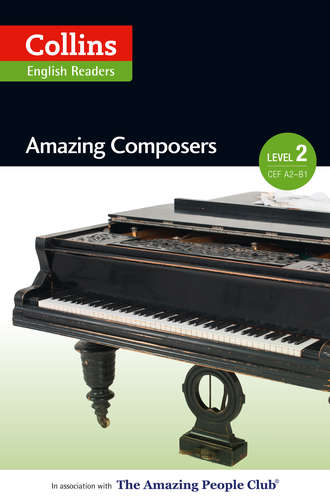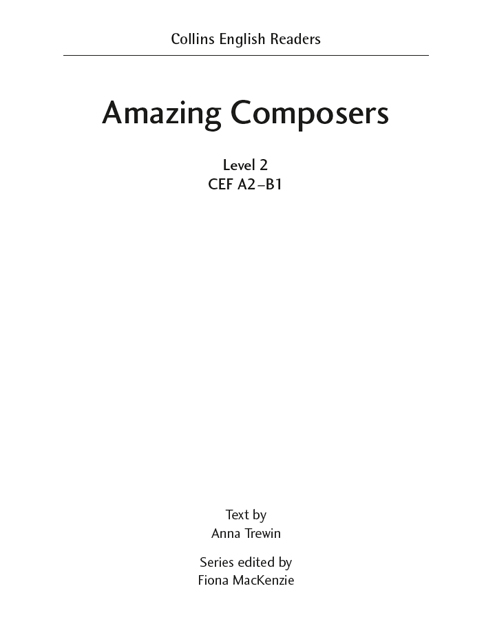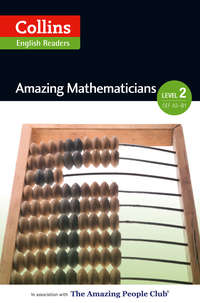
Полная версия
Amazing Composers: A2-B1




Cover
Title Page
Introduction
Grading Scheme
Johann Sebastian Bach
Wolfgang Amadeus Mozart
Giuseppe Verdi
Johann Strauss
Pyotr Ilyich Tchaikovsky
Irving Berlin
Keep Reading
Glossary
Copyright
About the Publisher


Collins Amazing People Readers are collections of short stories. Each book presents the life story of five or six people whose lives and achievements have made a difference to our world today. The stories are carefully graded to ensure that you, the reader, will both enjoy and benefit from your reading experience.
You can choose to enjoy the book from start to finish or to dip into your favourite story straight away. Each story is entirely independent.
After every story a short timeline brings together the most important events in each person’s life into one short report. The timeline is a useful tool for revision purposes.
Words which are above the required reading level are underlined the first time they appear in each story. All underlined words are defined in the glossary at the back of the book. Levels 1 and 2 take their definitions from the Collins COBUILD Essential English Dictionary and levels 3 and 4 from the Collins COBUILD Advanced English Dictionary.
To support both teachers and learners, additional materials are available online at www.collinselt.com/readers.
The Amazing People Club®
Collins Amazing People Readers are adaptations of original texts published by The Amazing People Club. The Amazing People Club is an educational publishing house. It was founded in 2006 by educational psychologist and management leader Dr Charles Margerison and publishes books, eBooks, audio books, iBooks and video content, which bring readers ‘face to face’ with many of the world’s most inspiring and influential characters from the fields of art, science, music, politics, medicine and business.


The Collins COBUILD Grading Scheme has been created using the most up-to-date language usage information available today. Each level is guided by a brand new comprehensive grammar and vocabulary framework, ensuring that the series will perfectly match readers’ abilities.
CEF band Pages Word count Headwords Level 1 elementary A2 64 5,000–8,000 approx. 700 Level 2 pre-intermediate A2–B1 80 8,000–11,000 approx. 900 Level 3 intermediate B1 96 11,000–15,000 approx. 1,100 Level 4 upper intermediate B2 112 15,000–19,000 approx. 1,700For more information on the Collins COBUILD Grading Scheme, including a full list of the grammar structures found at each level, go to www.collinselt.com/readers/gradingscheme.
Also available online: Make sure that you are reading at the right level by checking your level on our website (www.collinselt.com/readers/levelcheck).
Johann Sebastian Bach

1685–1750
the man who wrote the Brandenburg Concertos

I was one of Germany’s greatest musicians and composers. I could play the organ, violin, flute and harpsichord and many other instruments. I also composed many different kinds of music.

I was born on 21st March 1685 in Eisenach, Germany, and I was the youngest of eight children. My family was very musical. My father was director of the Eisenach musicians and he could play the violin and the harpsichord. Three of my uncles were professional musicians and one of them showed me how to play the organ. This instrument became very important in my life.
Unfortunately, my parents both died when I was only 9 years old. As a result, I was sent to live with my older brother, Johann Christoph, and his family. But I was fortunate because Johann Christoph was a musician and he continued to teach me the organ and the harpsichord. He also gave me music by well-known German composers to copy. This helped me to learn a lot about composing music. I watched my brother playing the organ and I learned a lot from him. Soon I could compose music and play many instruments. I was also an excellent singer, so I sang in my school’s choir. My teachers told me I was very talented at music. In 1700, I won a scholarship to study at Saint Michael’s School in Lüneburg.
When I arrived at Saint Michael’s, I was asked to join the school choir. This was an honour because the choir only accepted the most talented students. At weekends, I visited churches and listened to the finest German organ music.
After I left Saint Michael’s in 1703, I got a job in Weimar as a court musician, but the work was boring. However, I still gave performances in churches and people told me that I was a very good organist. As a result, I was soon employed as an organist for the people of Arnstadt. This position gave me a regular salary and I had time to compose my own music. Arnstadt was also close to my home town.
But I knew I needed to develop my talents. So I decided to leave Arnstadt for a short time to study with the famous organist Dieterich Buxtehude, in Lübeck. While I was there, I used the time to hear Buxtehude play as much as possible. I went to the evening concerts where his cantatas were performed.

When I arrived back in Arnstadt, I had a lot of new ideas which I started writing into my music. During this time, I also fell in love with a lady called Maria Barbara. We spent many hours together and soon we decided to marry.
I needed to earn more money because I wanted to get married and have children. So in 1707, I accepted a job as organist in Mühlhausen. There, I started making a collection of the best organ music. I also trained the choir and started a new orchestra. Our first performance, Gott ist mein König (God is my king), was given for the new Town Council.
A year later, I was asked by the Duke of Weimar to join his court chamber musicians. I accepted the job, and Maria and I moved to Weimar.
In 1714, the Duke appointed me as Director of Music. I had a good salary and my wife was happy in our new home. We decided to start a family, but unfortunately only four of our seven children survived infancy.
I made many good friends at Weimar. They included the scholar Johann Matthias Gesner. During this very busy and very creative time, I began to love Italian music. I spent many hours listening to the music of Vivaldi, Corelli and Torelli. I also wrote The Little Organ Book to help students who were learning to play the organ.

In 1717, I was offered the job of Director of Music by Leopold, Prince of Anhalt-Cöthen. I decided to accept the job and I told the Duke of Weimar I was leaving. But the Duke wasn’t happy and we argued. As a result, I was sent to prison for a month. It was a very cold and unhappy experience.
But I knew that I’d made the right decision. I was in charge of an orchestra of 18 men and I was paid a good salary at Cöthen. I also had time to compose music. The prince was a talented musician and we enjoyed playing together.

During my time in Cöthen, I wrote the Brandenburg Concertos and wrote six works for the cello. Life was good and the Prince often asked his orchestra to join him on his long journeys. But while I was travelling abroad with him I received some terrible news. My wife had died suddenly from an illness. I grieved for Maria Barbara very much and I was very unhappy. I also had to look after my children alone, so I didn’t have much time for my music.
The next year, Prince Leopold asked me to compose some cantatas to celebrate his birthday. Singers from nearby courts were invited to perform these works. One of them was a talented singer called Anna Magdalena, who was 19 years old. We fell in love, so I asked her to marry me. With Anna Magdalena I had thirteen more children, but only six of them survived infancy. I was lucky because Anna Magdalena was a wonderful mother to all my children.

In 1723, I was offered a new position as Director of Music at St Thomas’s School in Leipzig. I became Director of Music for the churches in the town, too. It was my job for the next 27 years. As well as teaching school subjects, I had to organize music for the town. I also had to teach students how to play instruments so they could perform in the orchestra. But there was still enough time to compose my music. During my time in Leipzig, I wrote my cantata cycles, violin and harpsichord concertos, and many other works.
In 1729, I was appointed Director of the Leipzig Collegium Musicum. Our group performed twice a week at Zimmermann’s Coffee House on Catherine Street. I continued to write music and wrote many of my masterpieces. These included the Canonic Variations and the Musical Offering and my Mass in B Minor. My last great work used all the skills I had learned as a composer – it was called The Art of the Fugue.
By now, I was becoming an old man. My hair had become grey and my eyesight was weak from working in bad light. I had two operations on my eyes. While I was recovering, I spent my last two months in a dark room. I used this time to finish a last Chorale Prelude. On 27th July 1750, I woke up and I could see well again. But later that day, I suffered a stroke and I died that evening.
The Life of Johann Sebastian Bach
1685 Johann Sebastian Bach was born in Eisenach, Germany. He was the youngest of eight children. 1694 Johann Sebastian’s mother died when he was 9 years old. 1695 His father died soon after his mother. Johann Sebastian left Eisenach to live with his brother, Johann Christoph, in Ohrdruf. During that time, he studied, performed, copied music, and learned to play the harpsichord. 1700 Johann Sebastian, aged 14, won a scholarship to study at Saint Michael’s School in Lüneburg. 1703 Johann Sebastian graduated from Saint Michael’s School in Lüneburg and was appointed court musician in Weimar. After that, he worked as an organist in Arnstadt. 1705 He went to study with the famous organist Dieterich Buxtehude, in Lübeck. He came back to Arnstadt the following February. 1707 He married Maria Barbara Bach. They had seven children but only four of them survived infancy. Johann Sebastian accepted the position of organist in Mühlhausen. 1708 He worked as organist and chamber musician for the Duke of Weimar. 1714 Johann Sebastian was made Director of Music at Weimar. He began writing The Little Organ Book. He never finished it. 1717 Johann Sebastian became Director of Music to Prince Leopold, at Cöthen. As a result of leaving his job with the Duke of Weimar, he was sent to prison for a month. 1720 Johann Sebastian’s wife died while he was travelling with Prince Leopold. 1721 He wrote the Brandenburg Concertos. Johann Sebastian also met and married Anna Magdalena Wilcke, a talented singer, at Cöthen. 1723 Johann Sebastian was made Director of Choir and Music in the town of Leipzig. It was his job for the next 27 years. 1727 He performed the St Matthew Passion and the Trauer Ode in the Thomaskirche. 1729 Johann Sebastian became the Director of the Collegium Musicum. 1733 He composed part of the Mass in B Minor. 1747–1749 He began writing The Art of the Fugue, and also composed the Canonic Variations and the Musical Offering. His health and eyesight began to fail.Конец ознакомительного фрагмента.
Текст предоставлен ООО «ЛитРес».
Прочитайте эту книгу целиком, купив полную легальную версию на ЛитРес.
Безопасно оплатить книгу можно банковской картой Visa, MasterCard, Maestro, со счета мобильного телефона, с платежного терминала, в салоне МТС или Связной, через PayPal, WebMoney, Яндекс.Деньги, QIWI Кошелек, бонусными картами или другим удобным Вам способом.


